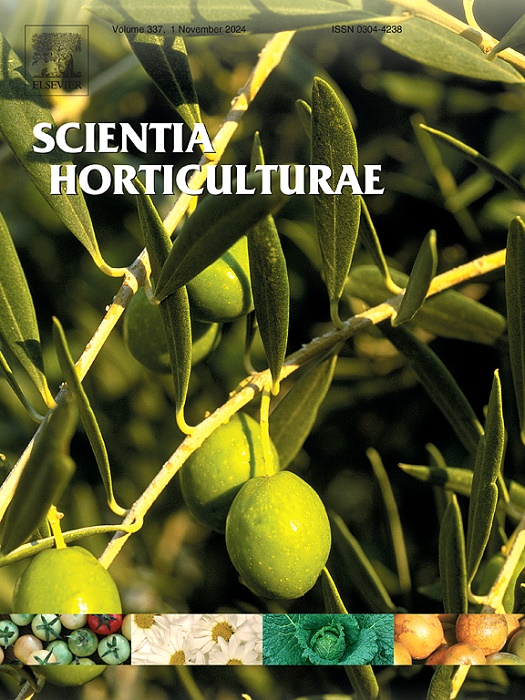盐胁迫下外源脯氨酸对芹菜营养和风味品质影响的综合评价
IF 3.9
2区 农林科学
Q1 HORTICULTURE
引用次数: 0
摘要
盐胁迫是限制蔬菜高产优质栽培的制约因素之一,目前外源脯氨酸对盐胁迫下芹菜品质的影响报道较少。本研究旨在探讨盐胁迫下外源脯氨酸对芹菜(Apium graveolens L.)品质的影响。采用隶属函数法,综合分析了100 mM NaCl胁迫下叶面施0.3 mM脯氨酸对芹菜矿质营养素、氨基酸、有机酸、硝酸盐、膳食纤维和挥发性成分的影响。结果表明,在盐胁迫下,外源脯氨酸抑制了芹菜Na含量和硝酸盐富集,促进了其他矿质元素(N、P、K、Ca、Mg、Cu、Fe、Mn和Zn)、甘氨酸、草酸、苹果酸、柠檬酸、木质素、膳食纤维和芳香化合物在叶片和叶柄中的积累。此外,隶属函数的综合评价分析结果表明,外源脯氨酸对盐胁迫幼苗是一种有效的处理方法,可显著减轻盐胁迫对幼苗的有害影响。综上所述,外源脯氨酸在盐胁迫下调节芹菜矿质元素平衡、甘氨酸积累、有机酸积累和芳香物质富集等方面发挥了积极作用。研究结果为盐碱条件下优质芹菜的栽培提供了理论依据。本文章由计算机程序翻译,如有差异,请以英文原文为准。
Comprehensively assessing the effects of exogenous proline on nutritional and flavour quality of celery (Apium graveolens L.) under salt stress
Salt stress is one of the constraints limiting high-yield and high-quality cultivation of vegetables, currently, the effect of exogenous proline on the quality of celery under salt stress is rarely reported. The study aimed to explore the comprehensive effects of exogenous proline application on the quality of celery (Apium graveolens L.) under salt stress. The affiliation function method was used to comprehensively analyze the effects of foliar application of 0.3 mM proline on celery mineral nutrients, amino acids, organic acids, nitrate, dietary fiber, and volatile components under 100 mM NaCl stress. Results showed that exogenous proline application inhibited Na content and nitrate enrichment in celery, and promoted the accumulation of other mineral elements (N, P, K, Ca, Mg, Cu, Fe, Mn and Zn), glycine, oxalic acid, malic acid, citric acid, lignin, dietary fiber, and aromatic compounds in leaves and petioles under salt stress. In addition, the results of a comprehensive evaluation analysis of the affiliation function indicated that the application of exogenous proline to salt-stressed seedlings was an effective treatment which significantly mitigated the salt-induced detrimental effects. Overall, exogenous proline played a positive role in regulating the balance of mineral elements, accumulation of glycine, accumulation of organic acids, and enrichment of aromatic substances in celery under salt stress. Results from this study provides a theoretical basis for cultivating cultivation of high quality celery under saline conditions.
求助全文
通过发布文献求助,成功后即可免费获取论文全文。
去求助
来源期刊

Scientia Horticulturae
农林科学-园艺
CiteScore
8.60
自引率
4.70%
发文量
796
审稿时长
47 days
期刊介绍:
Scientia Horticulturae is an international journal publishing research related to horticultural crops. Articles in the journal deal with open or protected production of vegetables, fruits, edible fungi and ornamentals under temperate, subtropical and tropical conditions. Papers in related areas (biochemistry, micropropagation, soil science, plant breeding, plant physiology, phytopathology, etc.) are considered, if they contain information of direct significance to horticulture. Papers on the technical aspects of horticulture (engineering, crop processing, storage, transport etc.) are accepted for publication only if they relate directly to the living product. In the case of plantation crops, those yielding a product that may be used fresh (e.g. tropical vegetables, citrus, bananas, and other fruits) will be considered, while those papers describing the processing of the product (e.g. rubber, tobacco, and quinine) will not. The scope of the journal includes all horticultural crops but does not include speciality crops such as, medicinal crops or forestry crops, such as bamboo. Basic molecular studies without any direct application in horticulture will not be considered for this journal.
 求助内容:
求助内容: 应助结果提醒方式:
应助结果提醒方式:


